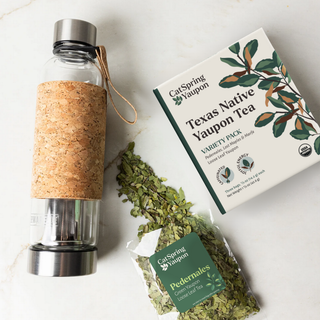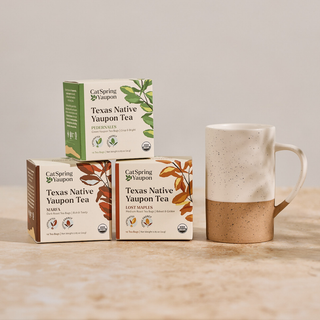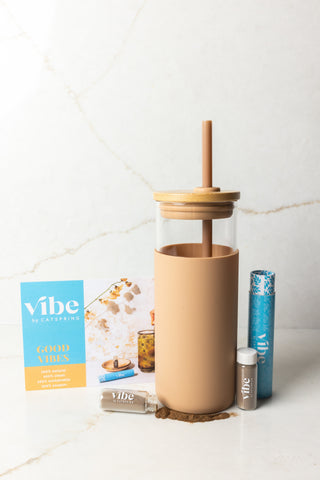Recovering from a hangover can be painful. Combatting a multitude of symptoms makes the next morning unpleasant. Hangover shakes alongside intense dehydration that causes headaches, dry mouth, and fatigue are amongst the issues we face after drinking too much the night before. But there are delicious teas that can combat these effects, along with their root causes, getting you back on your feet faster and better than ever. In this guide, we ranked and reviewed the best teas for a hangover.
If you want to get some for yourself, we have a collection of the best tea for a hangover right here in tea bags, loose leaf, or iced tea pouches.
What is the Best Tea for a Hangover?
1. Yaupon Tea
Yaupon is made from Ilex vomitoria rather than Camellia sinensis like many traditional teas. It lacks tannins, meaning you can steep it as long as you want and even reuse the leaves without your brew getting bitter. This makes it ideal for recovering from a hangover and keeping a rehydrating mug beside you all day long. Plus the gentle boost of caffeine to wake you up but not exacerbate your hangover symptoms is a great way to make the most of the day without the effects of the night before.
Benefits:
- Boost your immune system with the antioxidants (more than in blueberries) present in each sip of yaupon.
- Calm your anxiety and jumpiness with the help of l-theanine that can trigger the brain to produce more alpha waves which have a calming effect.
- Focus throughout the day due to theobromine that can improve short term working memory and attention.
Side Effects:
- May cause sleeplessness due to caffeine if large amounts of yaupon are consumed all at once.
Try our CatSpring Yaupon tea to recover from your night out. It’s organic, non-gmo, kosher, sustainably grown, and naturally caffeinated.
2. Matcha Tea
Matcha is a powdered green tea made from ground tea leaves. Each cup of matcha contains the entire tea leaf, meaning each cup tends to have a higher concentration of the benefits of tea. One such benefit is an added layer of protection for the liver. It helps to metabolize drugs, remove toxins, and process nutrients through a variety of mechanisms including decreasing cholesterol levels. In addition, like yaupon, matcha is able to help rehydrate after the dehydration from alcohol.
Benefits:
- More caffeine than most other teas which can have greater vasoconstrictive properties and aid in alleviating headaches.
- Supports a body detox with antioxidant properties that isolate and remove potential toxins from your system.
- Get better sleep with the help of magnesium from the chlorophyll in matcha to combat the poor sleep quality brought on by alcohol.
Side Effects:
- Can exacerbate upset stomachs due to the tannin levels that can aggravate an empty stomach and cause reflux, nausea, or vomiting.
3. Turmeric Tea
Turmeric has long been used in India in various dishes and is known quite well for its distinctive yellow color caused by curcumin. Ongoing research is determining the effects of curcumin in turmeric tea but it may have antioxidant, anti-inflammatory, and antidiabetic properties. Beyond helping heal some of the physical elements of a hangover, turmeric has a soothing effect on nerves which can relieve stress and anxiety.
Benefits:
- Stimulate blood flow which helps to flush out more of the toxins and alcohol to speed up recovery.
- Reducing inflammation caused by alcohol which can relieve inflamed tissues throughout the body and even improve skin appearance.
- Avoid negative caffeine effects because turmeric tea doesn’t have caffeine and won’t risk aggravating a hangover headache.
Side Effects
- Potential liver issues due to drinking too much curcumin (a lot more than a cup or two of turmeric tea).

4. Peppermint Tea
A refreshing tea with strong menthol essential oils that are nearly impossible to miss, peppermint tea is a great pick me up the morning after drinking. Beyond its abilities to combat more severe symptoms of a hangover, perhaps the fastest benefit to notice is its ability to freshen breath. While improving the smell of your breath, it can also kill germs that cause dental plaque.
Benefits:
- Improve mental clarity and concentration with the help of the powerful menthol essential oils.
- Relieve stomach pain and discomfort by relieving bloating, gas, and indigestion.
- Ease headaches as peppermint relaxes your muscles and mitigates the tension caused by inflammation and vasodilation.
Side Effects
- Can worsen acid reflux by relaxing the muscles around the stomach sphincter.
5. Hibiscus Tea
Hibiscus tea is made from steeping parts of the hibiscus plant and produces a flavor similar to cranberries. In animal studies, it has shown an ability to decrease markers of liver disease, though additional studies will be needed to confirm similar effects in humans. Though if these same benefits exist, they could help combat the lingering effects of drinking.
Benefits:
- Bolster your immune system with a host of antioxidant compounds including beta-carotene, vitamin C, and anthocyanin.
- Ease a troubled digestive system by reducing gas, cramps, and bloating as well as harmful bacteria.
- Decrease inflammation caused by alcohol which can damage tissues and organs.
Side Effects
- May decrease blood sugar levels which may be risky for individuals with diabetes.

6. Chamomile Tea
Chamomile is primarily brewed from one of two daisy-like species of flower and commonly known for its stress-relieving properties. It’s long been believed to have health benefits though many are still under research. One benefit is supporting a healthy heart through the compound flavones which has the potential to lower blood pressure and cholesterol levels.
Benefits:
- Get stress relief due to the powerhouse compound apigenin that can also relieve hangover symptoms including nausea, headaches, and and fatigues.
- Sleep easier thanks again to apigenin that binds to GABA receptors in your brain and releases signals that have a calming and relaxing effect.
- Relieve an upset stomach as research shows that chamomile extract (more potent then chamomile tea but similar effects may transfer) reduced vomiting in women undergoing chemotherapy.
Side Effects
- Potential drowsiness that may worsen fatigue from a hangover.
7. Ginger Tea
Ginger tea has a long history of use throughout Asia and is made by steeping ginger root, one of the most common ingredients globally. As many who fly know, ginger is often used as a remedy for motion sickness (check out all those passengers ordering ginger ale). Though further research is needed to confirm the effect and extent of the effect, some studies have shown that ginger may block a receptor in the brain responsible for vomiting, thus helping combat the symptoms of motion sickness.
Benefits:
- Combat nausea thanks to ginger’s active ingredient, gingerol, that’s been shown to relieve an upset stomach in pregnant women and chemotherapy patients.
- Support a healthy immune system with the powerful antioxidants to remove lingering toxins.
- Wake yourself up with its strong and distinctive flavor.
Side Effects
- May cause gas and bloating if you consume too much.
The Bottom Line
With their incredible properties that alleviate or negate the well-known hangover symptoms, these are some of the best teas for a hangover. They can relieve anxiety, improve sleep, boost energy, and freshen breath.
If you want to get our best tasting tea for hangover, check out our organic, naturally caffeinated CatSpring Yaupon tea here.
Medical Disclaimer: This article is for informative purposes only and shouldn’t be taken as medical advice. If you have serious health-related issues you should reach out to a medical professional. While we have studied the scientific research available, this is not intended to diagnose, treat, cure, or prevent any disease.













